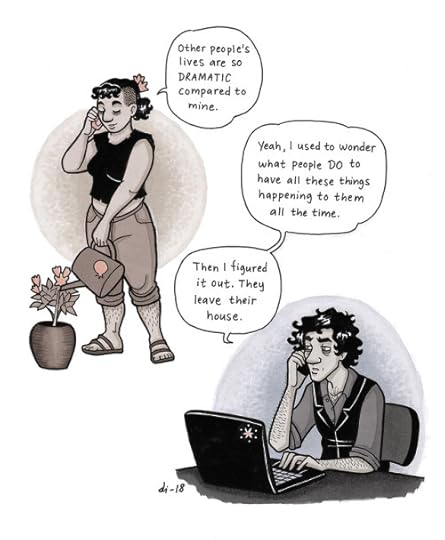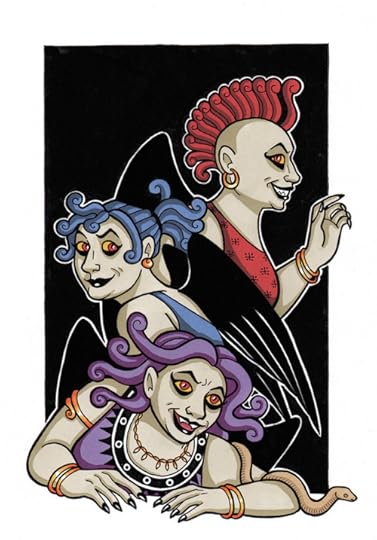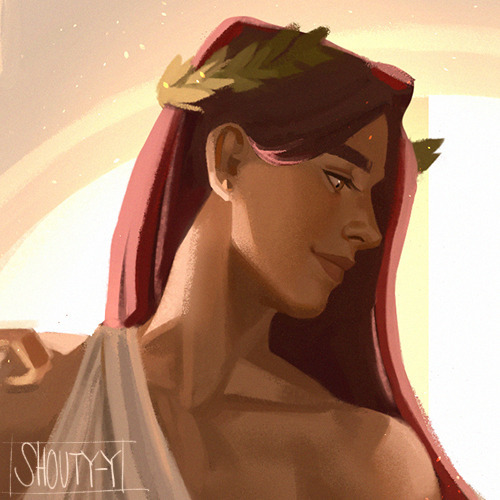Rachel Alexander's Blog, page 165
November 19, 2019
Name suggestion: A Hymn to Game of Outlander and the Sorcerer’s Crown
November 18, 2019
a-gnosis:
Hades and Persephone being… Hades and Persephone.
I...

Hades and Persephone being… Hades and Persephone.
I don’t really know why I put this in a modern context, since it would have worked just as well in an ancient one (well, minus the phones).
ponderation:
Treetops by Joni Niemela
November 17, 2019
thoodleoo:say what you will about the ancient romans and all of the terrible things they did in the...
say what you will about the ancient romans and all of the terrible things they did in the name of empire, but they understood how much jewelry shaped like snakes slaps and you really have to give them credit for that
Name suggestion: A Hymn to Game of Outlander and the Sorcerer’s Crown
a-gnosis:
Inktober 04: The Erinyes.
“They (the Erinyes in...

Inktober 04: The Erinyes.
“They (the Erinyes in Aeschylus’ play The Eumenides) disfigure their victims’ flesh with a foul disease, blight them with infertility, shroud them in darkness, and drain them of joy and vigor. Their own appearance is equally devoid of Helenic charm. Like a beautiful woman, they are a “wonder” to look upon, but this is because of the terror they inspire. According to a famous anecdote, during the play’s first performance pregnant women in the audience suffered miscarriages at the sight of them.”
“Athena herself says they look unlike “any kind of thing that is begotten,” whether god or mortal. They lack, in particular, the normal signs of femininity. They have dark skin, which is typically a feature of male masks, in contrast to the lighter complexion associated with women. They may also be wearing short outfits suitable to their role as hunters, which would, again, mark them as “masculine”. Though virginal, they lack the charm of the parthenos. They are described paradoxically as “aged girls”, “ancient children”, and “children who are not children”. This repeated use of oxymoron vividly conveys the Furies’ asexual nature. They embody childhood and old age at once, without the eroticism of the bride or the fertility of the mature woman that should lie between.”
Helen of Troy: Beauty, Myth, Devastation by Ruby Blondell
shouty-y:
The artist and their muse ✨
November 16, 2019
Can we give name suggestions or would there be legal issues?
I just check with my executive producer, and she said suggest away. Shouldn’t be any legal issues.
November 15, 2019
Persephone Epithets
Azesia- “of the Dried Fruits” and/or “Who Seeks”. The epithet is shared with her mother, Demeter. It is possible the double meaning is intended to link them while referring to their separate aspects.
Brimo- “the Angry” or “the Terrifying”. An alternative interpretation places the meaning as “of the Crackling Fire.” This epithet was most commonly shared by Persephone, Demeter, Hekate, and Cybele. However, many Goddesses are known to be called by this name. The interpretation of “the Crackling Fire” refers to Hekate bearing the torches during the initial search for Persephone.
Carpophorus- “Bringer of Fruit”. This epithet was specific to Persephone in the role of Kore. She shared it with Demeter. This was a common epithet used at their temple in Tegea.
Chthonia- “of the Earth” or “Subterranean”. This is an epithet common to any deity who journeys to the Underworld. Notably, it is shared by Hades, Persephone, Demeter, Hekate, Hermes, and Dionysus.
Daeira- “Knowing One”. Demeter’s and Persephone’s Mystery traditions were one of the first and most well-known. Persephone comprehended the mysteries of living and death. She knew the mechanisms of the Earth.
Deione- “Daughter of Demeter”.
Despoena- “The Ruling Goddess” or “The Mistress.” This epithet is shared by Persephone, Demeter, and Aphrodite.
Eleusina- “of Eleusis”. This epithet is shared by Persephone and Demeter. The main area of their worship was the town of Eleusis in Attica.
Epaine- “the Fearful”. It is not that Persephone herself was afraid, but her worshipers praised her because of how they feared her.
Hagne- “Pure” or “Holy One”.
Hercyna- “of the Stone Enclosure”. This is a poorly understood epithet. In my opinion, it refers to her domain in the Underworld.
Kore- “The Maiden”. This is an alternate name for Persephone and was her original name before joining Hades in the Underworld. It can be used for her at any time.
Leptynis- There is no solid interpretation of this epithet. Leptins were small Greek coins used in ancient times, so I often think this means “of the Coins.” This would work because her husband was Hades, Lord of Riches and coins were used as payment to enter the Underworld.
Megala Thea- “Great Goddess”.
Melitodes- “Sweet as Honey”. Persephone, as seen above, was considered to be a terrifying Goddess. This epithet was used as a way of invoking her softly, with compliments.
Praxidike- “Bringer of Justice”.
Protogone- “First Born”. This is another poorly understood epithet. I interpret it as a nod to Persephone as Demeter’s first-born child. (Zeus had many Goddesses he considered to be his Queen. Demeter was one of them, and Persephone is often considered to be their child from this time.)
Soteira- “Savior”. An epithet shared by many Goddesses including Artemis, Persephone, Athena, and Eunomia. In Laconia and Arcadia, this was commonly used by worshipers of Persephone. A similar epithet is shared by Hades and Dionysus, as well as many other Gods.
(Source: theoi.com- Titles of Demeter & Kore: Ancient Greek Religion)
I hope this is a helpful list for anyone interested in worshiping Persephone. These are her main epithets. I took out alternate spellings and epithets which had the same meanings but were less widely known than the ones shown here. If you are interested in ideas on when to use these epithets or inspiration based on them, shoot me an ask!
Show news soon? Please? We're dying
me too bitch me too.
I’m in hurry up and wait mode right now. I’ll tell you what I know when I am allowed to tell you what I know ;)
Be assured though, the thing I’m keeping under my hat is BIG.







